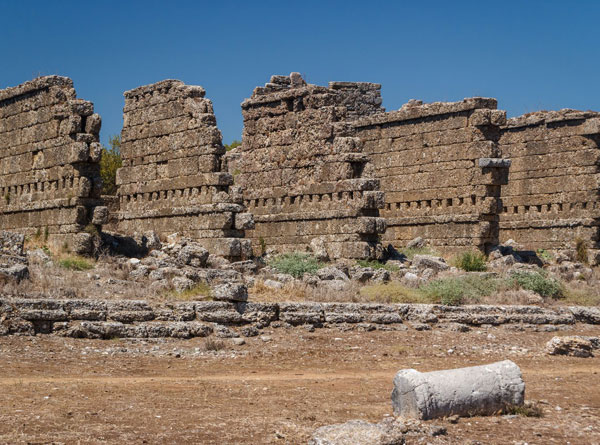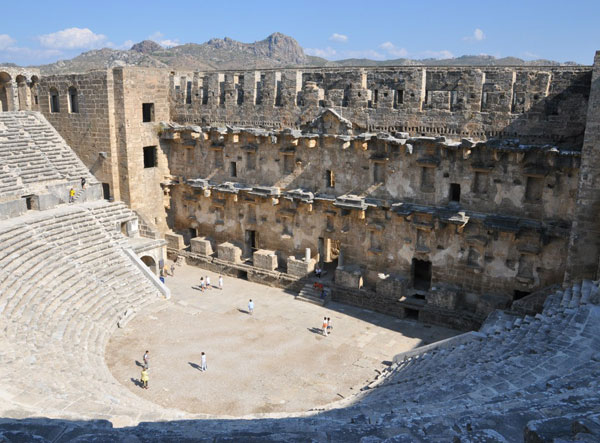Aspendos was an ancient city in Pamphylia, Asia Minor, located about 40 km east of the modern city of Antalya, Turkey. It was situated on the Eurymedon River about 16 km inland from the Mediterranean Sea; it shared a border with, and was hostile to, Side.[2]
Some scholars associate the city's name with "Azatiwadaya". The known city of that name was founded by Azatiwada of Quwê on his eastern frontier, at Karatepe.[3] According to later tradition, Aspendos was founded rather earlier by Greeks who may have come from Argos.
The wide range of its coinage throughout the ancient world indicates that, in the 5th century BC, Aspendos had become the most important city in Pamphylia. At that time the Eurymedon River was navigable as far as Aspendos, and the city derived great wealth from a trade in salt, oil and wool.
Aspendos did not play an important role in antiquity as a political force. Its political history during the colonisation period corresponded to the currents of the Pamphylian region. Within this trend, after the colonial period, it remained for a time under Lycian hegemony. In 546 BC it came under Persian domination. The fact that the city continued to mint coins in its own name, however, indicates that it had a great deal of freedom even under the Persians.
Circa 465 BCE Cimon led an Athenian navy against a Persian navy in the Battle of the Eurymedon, and destroyed it. Aspendos then became a member of the Delian League.[4]
Aqueduct of Aspendos
The Persians captured the city again in 411 BC and used it as a base. In 389 BC Thrasybulus of Athens, in an effort to regain some of the prestige that city had lost in the Peloponnesian Wars, anchored off the coast of Aspendos in an effort to secure its surrender. Hoping to avoid a new war, the people of Aspendos collected money among themselves and gave it to the commander, entreating him to retreat without causing any damage. Even though he took the money, he had his men trample all the crops in the fields. Enraged, the Aspendians stabbed and killed Thrasybulus in his tent.
When Alexander the Great marched into Aspendos in 333 BC after capturing Perge, the citizens sent envoys asking him not to garrison soldiers there. He agreed, provided he would be given the taxes and horses that they had formerly paid as tribute to the Persian king. After reaching this agreement Alexander went to Side, leaving a garrison there on the city's surrender. Going back through Sillyon, he learned that the Aspendians had failed to ratify the agreement their envoys had proposed and were preparing to defend themselves. Alexander marched to the city immediately. When they saw Alexander returning with his troops, the Aspendians, who had retreated to their acropolis, again sent envoys to sue for peace. This time, however, they had to agree to very harsh terms; a Macedonian garrison would remain in the city and 100 gold talents as well as 4,000 horses would be given in tax annually.
In 190 BC the city surrendered to the Romans, who later pillaged its artistic treasures.[5] Toward the end of the Roman period the city began a decline that continued throughout Byzantine times.











